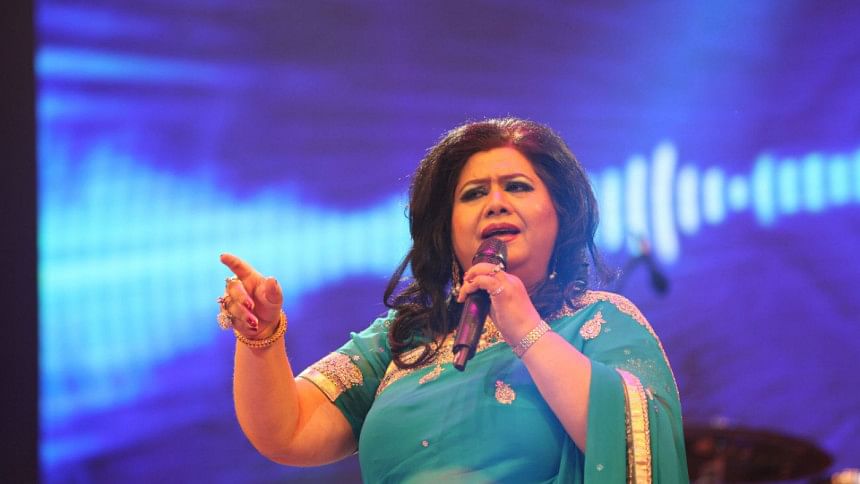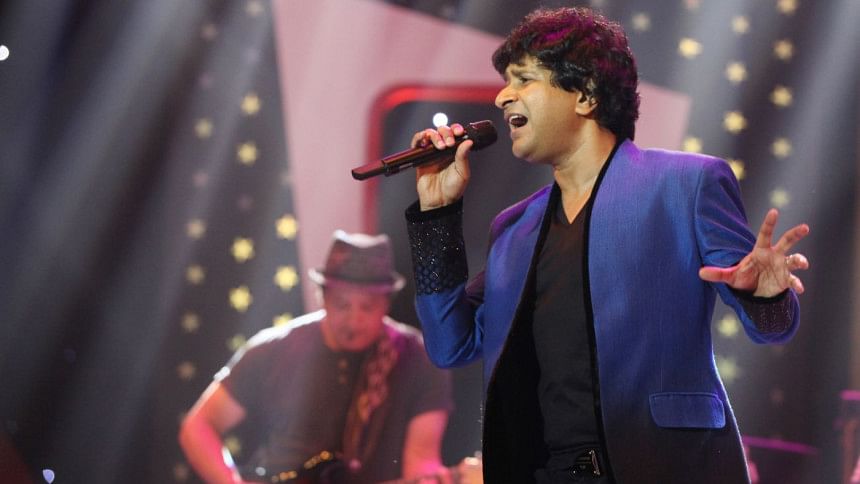Shine bright like a diamond

“It was around 1974 when I recorded that song, in Kolkata. It became a huge hit there, and a few months later when I was traveling back there, the immigration officer at the airport kept looking at my passport, matching my face and photo. He hesitated, and then said (in heavy Kolkata accent) 'Didi, apni ki sei sad'er lau?'”
Runa Laila's career is filled with such many a gem of a memory; it has been a long, glorious career spanning a colossal five decades. And the iconic figure of Bangla music celebrated it in style on Friday at the Bangabandhu International Conference Centre, where she shared the anecdote with the audience.
Organised by Entourage Entertainment and sponsored by Sajeeb group, the event had Runa Laila's contemporaries in attendance, and the artiste gracefully called them on stage to be a part of the occasion – from veterans like Khurshid Alam, Rafiqul Islam, Abida Sultana and Shakila Zafar to youngsters Dithi and Kona – to perform on stage – some of her biggest hits, from the energetic “Shilpi Ami Tomader'I Gaan Shonabo”, “Istishoner Raigari Ta”, “Shadher Lau”, “Paan Khaiya Thot Laal Korilam”, “Bondhu Tindin”, “Ei Brishti Bheja Raate” to the melodic “Jokhon Thambe Kolahol”, “Porodeshi Megh”, a Mehdi Hassan ghazal “Ranjish Hi Sahi” and her international hits “De De Pyaar De”, “Mera Babu Chhayl Chhabila” and “Duma Dum Mast Kalandar”, among others.

She dedicated “Je Jon Premer Bhab Jane Na” to a beaming Ferdausi Rahman, who was earlier invited to stage to present her the first of many floral bouquets, and to cut a cake in presence of friends and family (Runa's husband Alamgir and brother Syed Ali Murad), and high-ups of Rtv (who broadcast the event live) and Entourage Entertainment.
Although she chose the set list based more on popularity than her vocal prowess, on stage Runa Laila was every bit the legend she is – with her charming, almost-frivolous body language and a voice that still packs a bigger punch than artistes much younger. Her accompanists included accomplished musicians – the likes of Foad Nasser Babu on keys and Muniruzzaman on flute and brass, and the audience's hearts were quenched.
Pakistani actor Fawad Khan came on stage next, rather inexplicably just for a few minutes of conversation (mostly with the hosts Naveed Mahbub and Maria), although his presence drew a significant amount of excitement from the young girls in the crowd. He left with the promise of meeting his fans backstage.

Krishnakumar Kunnath – known by the acronym KK -- has been the steadiest of Bollywood singers of the late nineties and 2000s, so it would be no surprise that he would get the crowd in groove. In a perfect mix of exuberance, a killer smile and perfect notes, he delivered hit after hit – from the bubbly “Kya Mujhe Pyaar Hai”, “O Humdum”, “Mujhko Pehchan Lo”, “Hai Junoon” and “Tu Hi Meri Shab Hai” to the romantic “Dil Ibadat”, “Khuda Jaane” (on Runa Laila's request), “Abhi Abhi”, “Awarapan Banjarapan”, “O Meri Jaan”, Yaara Re” to the soulful “Yaaron Dosti” and “Pal” and even found time for a Bangla song he recorded long back, but the highlight of the set was his first major Bollywood hit, the heart-wrenching “Tadap Tadap” from “Hum Dil De Chuke Sanam” – which he recalled of recording at a quaintly surreal hour of 4am in the morning, after he, the music director and others slept at the studio, failing to record it on scheduled time due to technical difficulties.
In an industry where veterans say artistes are not honoured and celebrated in their lifetime – and only recalled after their death, the concert remained a bright instance – and hopefully a trendsetter, for celebrating the life and works of the greatest artistes of this country at various fields of creative media.

 For all latest news, follow The Daily Star's Google News channel.
For all latest news, follow The Daily Star's Google News channel. 



Comments